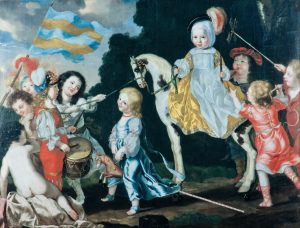Contributor(s): Shared on: Categories: Tags: | Source (Yiddish) | Translation (English) |
|---|
איך קוּם צוּא דיר בּעטין דוּא זאָלסט בּאלד פוּן מיר ליבּער גאָט
אָפּ טאָן דעם צער װאָס איךְ טראָג אױף מײַן הארצין,
װעגין װָס איך האָבּ אשװערין מַזֶל צוּ מײַנע קינדר,
איך בּעט דיך ליבּער הער גאָט,
טוּא צוּא מיר אזױ װיא אײן פאָטער צוּ א קינד,
אוּנ טוּא װײַטער פוּן מיר אָפּ דײַן צאָרין,
|
I come pleading to You, Beloved God,
that You rid me of this pain that I carry in my heart,
of having bad luck with my children.
I beseech You, Beloved Lord God:
do to me like a father [would] to his children,
and continue ridding me of Your wrath. |
דיא קינדער װאָס איך האָבּ לאָזין מיר אלע לעבּין
אוּנ קײַן קינד זאָל ניט שטארבּין,
אוּנ מיר זאָלין זוֺכֶה זײַן זײא צוּא דר ציען לְתּוֺרָה
וּלְחוּפָּה
וּלְמַעֲשִׂים טוֺבִים מיט יִרְאַת שָׁמַיִם,
אָמֵן וְאָמֵן׃
|
The children I have, let them all live,
and not one child die.
And may we merit to raise them to [follow] Torah,
to [the wedding] Khupe,
and to [a life of] good deeds with fear of Heaven —
Amen and Amen! |
“Women who Have Bad Luck with Children Should Recite this Tkhine” by an unknown author is a faithful transcription of the tkhine published in Rokhl m’vakoh al boneho (Raḥel Weeps for her Children), Vilna, 1910. I have transcribed it without any changes from The Merit of Our Mothers בזכות אמהות A Bilingual Anthology of Jewish Women’s Prayers, compiled by Rabbi Tracy Guren Klirs, Cincinnati: Hebrew Union College Press, 1992. shgiyot mi yavin, ministarot nakeni. English translation by Baruch Jean Thaler. (Thank you!) Source
 Baruch (B.J.) Thaler received his B.R.S. from United Lubavitch Yeshivah Tomchei Temimim (Morristown); Smichah (Rabbinical Ordination) from Central Yeshivah Tomchei Temimim Lubavitch (770); B.A. (Eng. Lit./Creative Writing) & M.F.A. (Film) from Columbia University. Baruch grew up Chabad in Crown Heights, Brooklyn, speaking Yiddish. Later, he worked for the Folkbeine Yiddish Theater and the New Yiddish Repertory, translating and acting in stage classics. He also worked on Yiddish translation for the Milken American Jewish Music Archives and others, and was a writer-editor for the Yiddish “Algemeiner Journal” and film-editor for "The Forward." His Hebrew translation projects include “The New American Haggadah,” the works of the late Lubavitcher Rebbe, and of other Hasidic-Kabbalistic masters. Film credits include: “Projecting Freedom,” “Romeo and Juliet in Yiddish,” “Punk Jews”; he also filmed Yiddish legends Mine Bern and Mike Burstyn. He has spent some time organic farming. Still a Shliach (outreach “rabbi”) in heart - Baruch coordinated a troubadouring tribe of kindred spirits, first called “Home of HoWL” (Holy Wow Love) and more recently as Nitzotzot, who are creating new exciting ways to reexperience the traditions and rituals of yore, bridging heimish hasidism with homie hipsterdom. When the spirit is right, Baruch comes up with a niggun or two -- especially if it will help enhance davvening with kavvanah... Sometimes the best we can do in attributing a historical work is to indicate the period and place it was written, the first prayer book it may have been printed in, or the archival collection in which the manuscript was found. We invite the public to help to attribute all works to their original composers. If you know something not mentioned in the commentary offered, please leave a comment or contact us. Aharon Varady (M.A.J.Ed./JTSA Davidson) is a volunteer transcriber for the Open Siddur Project. If you find any mistakes in his transcriptions, please let him know. Shgiyot mi yavin; Ministarot naqeni שְׁגִיאוֹת מִי־יָבִין; מִנִּסְתָּרוֹת נַקֵּנִי "Who can know all one's flaws? From hidden errors, correct me" (Psalms 19:13). If you'd like to directly support his work, please consider donating via his Patreon account. (Varady also translates prayers and contributes his own original work besides serving as the primary shammes of the Open Siddur Project and its website, opensiddur.org.) Read a comment / Leave a comment (moderated) Works of related interest: |





!["[holding hands]"U.S. Air Force Airman 1st Class Ryan Macri, a 606th Air Control Squadron radio frequency transmission journeyman, holds hands with his wife Ashley Oct. 4, 2014, at Spangdahlem Air Base, Germany. The Macris spent time together before Ryan left for his first deployment. (U.S. Air Force photo by Airman 1st Class Dylan Nuckolls/Released)](https://opensiddur.org/wp-content/uploads/2016/07/141004-F-LX214-431-250x250.jpg)





Leave a Reply